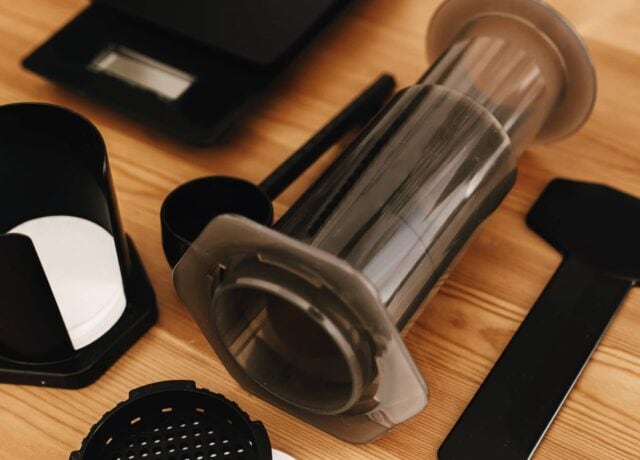Whether you‘re expanding your current coffee business into a new kiosk location or starting a mobile coffee operation, a propane espresso machine, or LPG (liquid propane gas) machine, can make your life easier.
Coffee carts and kiosks without power sources require a coffee machine that operates on propane, a battery, or an electric generator. Gas-powered coffee makers can run solely on propane, eliminating the need for an electric generator.
You can convert some electric espresso machines to operate on propane. But unless you‘re mechanically inclined and confident, it‘s easier and safer to purchase an espresso machine already designed for use with propane.

Commercial vs. Consumer Propane Coffee Makers
While avid campers might choose a propane coffee maker for their outdoor adventures, a propane espresso machine is designed for commercial use by mobile coffee businesses.
Commercial Propane Espresso Machines
Commercial propane espresso machines cost several thousand dollars. They tend to weigh at least 60-75 pounds empty, while a home espresso machine typically weighs 30 pounds or less.
Consumer Propane Coffee Makers
A propane coffeemaker for consumers is a standard drip-style device. They brew a pot of coffee anywhere that is without electricity or the ability to boil water.
You can’t make espresso with these machines, but they’re small, portable, and relatively inexpensive for people who still want their java fix while camping.
Features of a Propane Espresso Machine
Espresso machines, whether propane-powered or electric, come in four general varieties:
- Manual
- Semi-automatic
- Automatic
- Super-automatic
Each has its benefits and drawbacks. And when you factor in the difference in operation between a propane machine and a standard electric model, you might want to choose a machine with a different level of automation.
Manual
Lever or manual espresso machines require the barista to have coffee-making knowledge. The pressure is applied manually to pull a shot, so the operator’s skill determines the quality of the coffee.
Experienced baristas might prefer these piston-driven lever machines to give them complete control of the product every step of the way. Without a skilled operator, however, it’s more difficult to achieve consistency and quality.
Since a manual propane espresso machine requires the least power, they don’t use much gas and won’t create the same power drain as a more automated machine.
Semi-Automatic
Semi-automatic espresso machines do some of the work for you but still require some espresso-making skills. They don’t use a piston, like manual machines, so they’re much less labor-intensive.
The barista uses a button or lever to start the process and determines when to stop pulling the shot. Unlike more automated machines, the barista has complete control over how long to pull.
Like lever machines, these machines don’t create a massive power drain and can be an excellent choice for a coffee cart, van, or kiosk with a limited electricity supply.
Automatic
Automatic machines pull each shot for you. Timed brewing is the only significant difference between an automatic espresso machine and the manual and semi-automatic versions.
You’ll still have to grind the coffee beans and tamp them into the puck, but the machine uses a timer to pull each shot. This level of automation allows less-skilled operators to make espresso with consistent quality from shot to shot.
The trade-off for consistency and timer-operated brewing is a more significant fuel drain and longer recovery time for the boiler to reach its peak temperature.
Super-Automatic
A top-tier super-automatic espresso machine is the push-button coffee maker that offers ease of use and consistent results. Super-automatic machines cost more than other types because they do everything for you, including grinding coffee beans, tamping, steaming, and pulling shots.
Many super-automatic machines even have programmable milk-frothing capabilities. However, these machines aren’t well-suited for propane power because of higher wattage requirements, but you might find some models that do almost everything for you.
What to Look for in a Commercial Propane Espresso Machine
Once you settle on your desired level of automation, determine the fuel options you want and what size of machine you need.
Machine Sizes and Capacity
A small manual machine uses less power and requires less recovery time to get back to full pressure, but you can only make one or two drinks simultaneously.
A larger semi-automatic or automatic machine offers the ability to serve more customers faster. A semi-automatic propane espresso machine with a 7-liter boiler, for instance, could produce up to 200 espressos per hour, while a manual one with the same boiler size might only produce 50-100 per hour.
Dual boilers allow you to brew and steam milk at once. A one-group machine lets you make two espressos simultaneously, while a two-group espresso machine doubles your output to four.
Larger three-group machines make it easy for more than one person to make coffee at the same time. Three-group devices are suitable for electric or generator power of at least 220v.
Types of Power Supply
You can purchase a propane espresso machine that runs solely on gas, and some can operate on propane or butane and electricity. Other models run on gas or a 12-volt battery.
Choosing a machine with the most options means you won’t be limited in the future if circumstances change.
Some propane espresso machines need longer recovery times to bring the boiler back up to temperature. Models that use electricity or battery power alongside gas are usually better for higher volume sales when speed is a consideration.
A more powerful two-group, dual-boiler machine, and a 220v generator might be your best option if you anticipate high-volume sales. If you want to run a high-volume, super-automatic espresso machine, a generator is a must.
A Propane Espresso Machine Perfect for Your Business
A propane espresso machine is a substantial investment with several factors to consider, including:
- Location
- Size of the crowd you are serving
- Barista’s skill and experience
- Volume of anticipated sales
- All available power options
Taking these factors into account, you can choose the best propane espresso machine for your coffee cart, van, or kiosk.
Happy Caffeinating!







